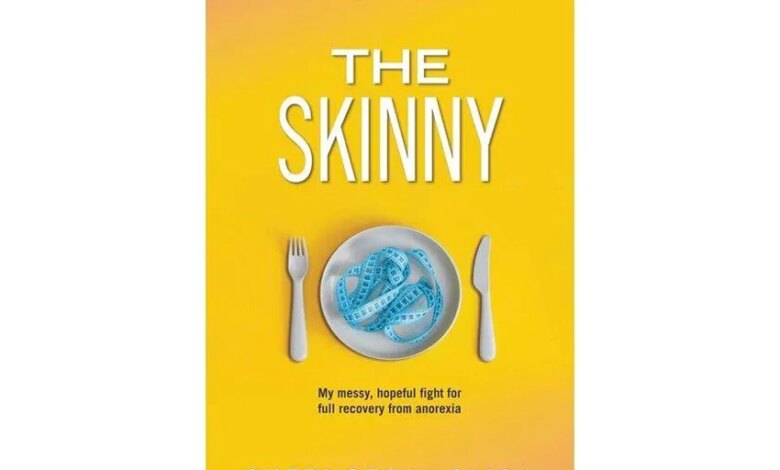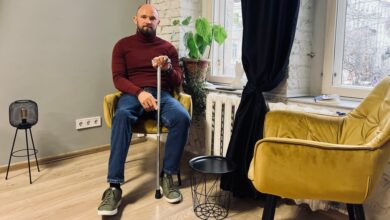A mother of three describes her experience of anorexia in middle age

After Sheri Segal Glick struggled with anorexia in her teens, she thought she’d beat the disease for good. But as the Ottawa lawyer and mother of three discovered, contrary to popular belief, eating disorders aren’t just for young people. With raw honesty and a hearty dose of wry humor, her new memoir “The Skinny” sheds light on how to deal with eating problems in middle age. Here’s an excerpt from the book.
Finding out you still have an eating disorder years after you thought you’d recovered is akin to finding out you’re pregnant. Suddenly you understand why you often don’t feel like eating and why you’re not feeling well. You understand why you have weird food aversions and/or digestive problems and why you always feel cold (or hot, in the case of pregnancy). You may be in shock and may need an adjustment period. You understand why you don’t get your period. Maybe you’re scared. Or maybe you’re in denial and gave birth to your prom.
I know it seems weird not knowing you have an eating disorder, especially when you’ve been treated for it for years. But there’s something called anosognosia, which is a symptom of a mental illness that impairs a person’s ability to perceive their mental illness (amazing, right?). That’s why some people with anorexia don’t know they’re sick. In my case, I knew I had been sick, but I was also pretty sure I wasn’t sick anymore. I ate something other than veggies, popsicles, and Diet Coke, I didn’t spend four hours a day in the gym, and I ate carbs! And candy! And really, do people with anorexia eat chocolate? (Yes sometimes.)
Every once in a while I had a pang of is-this-normal? Not when I secretly shoved food from my plate to my husband at dinner parties when the hosts weren’t looking, or when I couldn’t have lunch until after my cleaner left because I didn’t want her to see me measuring my yogurt, or when I didn’t get my wedding cake. couldn’t eat, or when I needed medicine to ovulate to get pregnant because I didn’t get a period. Not those times. But after the birth of my first child, who was born perfect but small (#humblebrag), I was plagued with the idea that it was my fault he was so small. I worried that I should have gained more weight while pregnant, or exercised less, or ate more fat. I even went so far as to Google articles about recovered anorexics giving birth to small children (I know!). But really, other than that one moment of near clarity, I was pretty sure I was fine, and two years later I had a second little baby.
Then came my third pregnancy. This one felt different because I wasn’t hungry anymore. I could force myself to eat because I knew I couldn’t starve my unborn child (motherhood really does bring out the best in people!) but I spent much of that time in fear, given how guilty and uncomfortable I felt eating without appetite. After I gave birth my hunger pangs returned, but then, about nine months after my daughter was born, they stopped again and I was paralyzed with anxiety at every meal, anticipating the post-dinner anxiety I had become so accustomed to during my pregnancy.
Finally, I went to the doctor and told her I didn’t feel like eating anymore. She ordered blood tests. They couldn’t find anything crazy. More testing. They still couldn’t fault anything. The uneasy feeling that I was unwell, but didn’t know why, lasted more than a year. I was often stressed, had a shorter fuse than usual, couldn’t sleep, had pelvic floor problems (I’m not going to elaborate) and of course no hunger signals.
I forced myself to eat, but it wasn’t enough and I lost weight. Since I was nursing a baby and running after two other small children, the ten pounds or so I lost initially were easy to explain to anyone who noticed. And then one day I stepped on the scale and the number flashing red was one I hadn’t seen as an adult. I felt fear elation.
Sensing that the elated part was not a good thing, I made an appointment with a psychologist. The wait to see her lasted about eight months, and by the time my name came up, I was starting to get hungry again and my eating patterns were mostly back to normal. But I went to the appointment anyway.
Psychologist: “What brings you here today?”
Me: “First of all, I actually made this appointment in the 1980s. Do you have any idea how long your waiting list is? What if I was really sick? I mean, I’m not, but I’m sure there are a lot of people out there who really need help. It’s very bad.”
Psychologist: “Yes, my waiting list is long. Thank you for holding out. What brings you here today?”
Me: “When I first made this appointment…eight months ago…I had no appetite and couldn’t eat, and one day I weighed myself and realized I had lost more weight than I had noticed … which I guess makes sense because I couldn’t keep any of my pants up without rolling them up at the waist Anyway my hunger signals are pretty much back to normal so that’s good news because as long as I have hunger signals I can i eat.
Psychologist: “Can’t you eat if you’re not hungry?”
Not me.”
Psychologist: “What if it’s dinner time?”
Not me.”
Psychologist: “I’m glad you’re here. Tell me more about that.”
Me: “Meh. Not much to tell, I feel guilty and stressed if I eat when I’m not physically hungry so I don’t really. It may be a holdover from my anorexic days.”
Psychologist: “Tell me about the anorexia.”
Me: “I was very sick when I was a teenager, but then I decided I didn’t want to be in and out of the hospital for the rest of my life. I started eating more and my weight went up, and now – as long as I’m hungry – I eat three meals a day. I am actually completely better.”
Psychologist: “If you are all better, then why did you come today?”
Me: “I have small children and I know eating disorders have a genetic component. I want to get rid of my dragging behavior so I can set a good example. Psychologist: What behaviors are you concerned about?
Me: Well, I can’t eat anything unless I know the exact number of calories, which means I have to weigh and measure everything, and I can’t eat in people’s homes or restaurants, and I’m terrified of oil in my food. And I sometimes feel crushing guilt after I eat.
Psychologist: “Is that it?
Me: Usually. I also exercise quite a bit every day and feel like I have to walk everywhere. Anyway…if we could fix those few things it would be helpful.
Psychologist: “Those are symptoms of your anorexia.”
Me: “I don’t have anorexia.”
Psychologist: “It’s functional anorexia, but it’s anorexia. You are still very ill.”
Me: “No, you are wrong. I’ve had anorexia and I know the difference… this isn’t it. Also functional anorexia? Is that an oxymoron?”
Psychologist: “No, it’s what you have.”
Me: “Well, it sounds ridiculous. Did I tell you I eat carbs? Do people with anorexia eat carbohydrates?”
Psychologist: “Yes.”
Me: “People without anorexia also eat carbohydrates. People like me.”
Psychologist: “Okay. Why are you here?”
Me: “I told you. To fix the lingering behavior I’ve got from being anorexic.
Psychologist: “Okay. Why don’t you go home and stop counting calories? Throw away your food scale. Stop exercising for a few days. And then come back and tell me how it went. If you don’t have anorexia, you should be able to sort these things out pretty easily.”
And so I found out at forty-four, with my food scale, and running injuries, and osteopenia, and huge mental database of calories, that I still had an eating disorder.
The Skinny by Sheri Segal Glick, $23, amazon.ca SHOP HERE
When you make a purchase using the links in this article, we may earn a small commission. Our journalism is independent and unaffected by advertising. Learn more.
“The Skinny” by Sheri Segal Glick. Used with permission of the publisher, re:books. Copyright 2023 by Sheri Segal Glick.

:format(webp)/https://www.thestar.com/content/dam/thestar/life/health_wellness/2023/07/04/no-eating-disorders-arent-just-a-teenage-disease-a-mom-of-three-details-her-experience-with-midlife-anorexia/inline_the_skinny.jpg)



